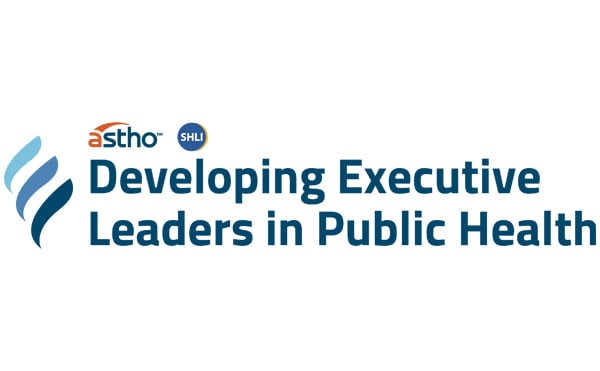The Search for Good Data to Support Health Equity in Public Health
September 06, 2023 | ASTHO Staff
 Facts and data are at the core of any good decision. Public health needs good data to make good decisions. And when it comes to health equity, we need to look at the data to promote the work public health is doing. Our cohort of Diverse Executives Leading in Public Health (DELPH) has subject matter experts utilizing data to achieve health equity in their everyday roles at their respective health departments—from the local to the state level.
Facts and data are at the core of any good decision. Public health needs good data to make good decisions. And when it comes to health equity, we need to look at the data to promote the work public health is doing. Our cohort of Diverse Executives Leading in Public Health (DELPH) has subject matter experts utilizing data to achieve health equity in their everyday roles at their respective health departments—from the local to the state level.
We turn to the DELPH scholars for their insights to learn more about how the data modernization initiative and diversity, equity, and inclusion (DEI) intersect with public health. Our scholars offer snapshots of what is happening, from data infrastructure to additional funding needs to collect sound data. We hope these stories continue the conversation on how data can be important in shaping future DEI work.
How does technology support and contribute to the important work of advancing DEI efforts within public health departments?
KRISTINE TRAN:
Technology plays a crucial role in supporting the work of DEI within public health departments. For example, data collection and analysis technology can assist in designing and implementing systems for collecting and analyzing data related to public health, which can include demographic data, health disparities, and social determinants of health. By ensuring accurate and comprehensive data collection, tech can help to identify disparities and assess the impact of public health interventions on different communities. Additionally, tech can support public health by developing inclusive communication strategies that reach many diverse populations. Enhancing communication efforts can engage marginalized populations and further promote health equity.
FREDRICK ECHOLS:
There has been a growing emphasis on the importance of inclusivity and fairness in collecting health data. However, recent findings reveal significant deficiencies in the quality of public health data, particularly in relation to individuals who identify with multiple races or have a non-conforming gender identity. Regrettably, this oversight by public health authorities at local, state, and national levels compromises the representativeness of public health reports and, ultimately, their ability to accurately reflect the overall health status of the population, particularly those who are most vulnerable and marginalized.
MICHELLE IZUMIZAKI:
With technology support, public health agencies can more efficiently and effectively identify solutions to help capture more comprehensive demographic data (e.g., age, ethnicity, race(s), gender identities, etc.) in a timely manner and create more positive end-user experiences. This will help public health agencies more effectively describe the state of health for populations within their jurisdiction, ensure public health programming is informed by data that accurately reflects all segments of a jurisdiction’s population, and ensure public health advocacy efforts are aligned with the community’s true needs. Most importantly, this will aid public health departments’ pursuit of equity and justice.
As a leader, what are the top points you would highlight when making a case for updating tech to equip and support community health and health equity?
DEBORAH HINDS:
Simply put, inadequate data produces ineffective results. The data available to most public health departments is woefully incomplete and does not produce results that drive equity-focused policies that will change the health trajectory of the historically marginalized. For decades public health professionals have disseminated data stating the stark differences in health outcomes across racial and ethnic groups with no significant improvements to report. Our progress is stagnant because our data and data systems are lacking.
FELICIANA TURNER:
If we aren’t advancing our technology, we will operate behind the curve, potentially jeopardizing our credibility. When a private sector entity can analyze and distribute data to the public far faster than the public health or other public sector entities can, we are not perceived as the go-to for data and interpretation. We will be less effective at getting data to community leaders and having the data inform action.
GAYATRI RAOL:
I would highlight sustainable funding and support for hiring and retaining the public health workforce. Currently, public health initiatives and programs are primarily dependent on grant funding. As soon as grant funding ends, work is badly impacted or discontinued. The efforts and progress are left stagnant or incomplete, only to resume or restart after a few years again. This leaves public health professionals confused and discouraged. To make an impact on communities and advance health equity, public health programs require a multi-year and multi-dimensional approach. And that approach will require sustainable funding, providing education/training to the current public health workforce, and compensating them justifiably to retain and hire professionals with advanced skills.
IZUMIZAKI:
As a senior policy analyst in my division, I have proposed legislative policies to increase state funding to modernize the cancer registry technology available. Our state’s current system is not efficient enough to support the demands of cancer cases and requires hours of work from staff. With the workforce challenges brought on by COVID-19, it has been more evident than ever that we need to improve our technology access to ensure our work continues to ensure everyone in their communities are being connected to care and resources regardless of where they live or their ability to pay.
ECHOLS:
Developing an equitable data collection system is a complex task that holds significant importance for the public health sector. It is vital to consider four key aspects when initiating these changes:
- Equity and justice must drive the tech solution development process. It is crucial to acknowledge that the existing structures and practices may not adequately cater to the well-being of marginalized and vulnerable populations. Thus, passive attempts to address the issue may be insufficient.
- Determine what information is needed. Establishing data standards and determining the essential information is a critical initial step that ensures the solution-creation process is well-informed, focused, and capable of effectively collecting and aggregating information.
- Keep the end-user in mind and solicit their feedback during the solution development process.
- Don’t forget about your stakeholders. It is crucial to consider other stakeholders who require access to the information collected. The lack of interoperability with other systems in the local public health ecosystem poses a challenge that must be addressed.
Developing an equitable data collection system requires a thorough understanding of the public health sector's intricacies and the development of comprehensive policies that promote fairness and inclusivity. By considering these key aspects, we can work towards building a data collection system that benefits all members of society, regardless of their background.
Related Content

Diverse Executives Leading in Public Health
ASTHO and the Satcher Health Leadership Institute at Morehouse School of Medicine began the DELPH program in 2021 with funding from CDC’s Center for State, Tribal, Local, and Territorial Support. The program recruits mid-to-senior-level governmental public health professionals from underrepresented groups in public health leadership to support learning, networking, and professional development opportunities to grow a diverse cohort of leaders nationwide.